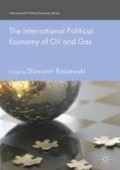Abstract
Oil, gas, cotton, gold and metals have become the main hard currency earners in independent Central Asia. In particular, three countries, Kazakhstan, Turkmenistan and Uzbekistan have formed their development paths around a combination of these resources, especially oil and gas. This chapter will look in detail at qualitative differences in the oil and gas industry across the region. How did post-Soviet countries decide to manage their hydrocarbon resources? How did they cope with Russian influence in the region’s Soviet-era distribution network? Did the emergence of China as a regional actor influence their resource governance?
The first section of the chapter lays out the importance of oil and gas in the political economy of these countries and the second section focuses on Kazakhstan, Turkmenistan and Uzbekistan as the biggest energy exporters. In each case, the peculiar historical path that these countries picked after independence will be expounded.
The third section of the chapter touches upon the qualitative difference between hegemonies and multivectorism, using the example of export pipelines to single out the importance of a Gramscian approach.
This work is influenced by Gramscian concepts such as hegemony and historical bloc, which will be used to build a bridge between International Political Economy (IPE) and energy security studies. By looking at hegemony as a process, which puts in a dialectic relationship different countries as well as transnational companies (TNCs) and state-owned enterprises, this work seeks to outline the nodes at which a country’s resource governance paradigm shifts: in particular, what causes concentration in the hands of the state to become preferable to an open market economy and vice versa.
Access this chapter
Tax calculation will be finalised at checkout
Purchases are for personal use only
Notes
- 1.
Dubai-based state-owned Emirates National Oil Company bought Dragon Oil in 1998.
References
Anceschi, L. 2010. Integrating Domestic Politics and Foreign Policy Making: The Cases of Turkmenistan and Uzbekistan. Central Asia Survey 29 (2): 143–158.
———. 2015. Turkmenistan’s Export Crisis: Is TAPI the Answer? Central Asia Policy Brief 27. Available from: http://centralasiaprogram.org/wp-content/uploads/2015/06/Policy-Brief-27-June-2015.pdf. Accessed 1 Nov 2016.
Brauer, B. 2012. Foreign Direct Investors and National Politics. In Challenges of the Caspian Resource Boom: Domestic Elites and Policy-Making, ed. A. Heinrich and H. Pleines. London: Palgrave Macmillan.
Bunce, V. 1999. The Political Economy of Postsocialism. Slavic Review 58 (4): 756–793.
Choudhury, S. 2012. ONGC Plan to Buy Kazakh Oil Field Stake Is a Sign of Things to Come. Rigzone, November 27. Available from: http://www.rigzone.com/news/oil_gas/a/122379/ONGC_Plan_to_Buy_Kazakh_Oil_Field_Stake_Is_a_Sign_of_Things_to_Come. Accessed 1 Nov 2016.
Cox, R. 1987. Production, Power, and World Order: Social Forces in the Making of History. New York: Columbia University Press.
Femia, J.V. 1981. Gramsci’s Political Thought: Hegemony, Consciousness and the Revolutionary Process. Oxford: Clarendon Press.
Furman, D. 2005. The Regime in Kazakhstan. In Central Asia at the End of the Transition, ed. B. Rumer. Armonk: M.E. Sharpe.
Hanks, R. 2009. ‘Multi-Vector Politics’ and Kazakhstan’s Emerging Role as a Geo-Strategic Player in Central Asia. Journal of Balkan and Near Eastern Studies 11 (3): 257–267.
Jones Luong, P., and E. Weinthal. 2010. Oil Is Not a Curse: Ownership Structure and Institutions in Soviet Successor States. New York: Cambridge University Press.
Mazat, N., and F. Serrano. 2013. An Analysis of the Soviet Economic Growth from the 1950’s to the collapse of USSR, second draft [Online]. Centro Sraffa. Available from: www.centrosraffa.org/public/bb6ba675-6bef-4182-bb89-339ae1f7e792.pdf. Accessed 1 Nov 2016.
Morton, A. 2007. Unravelling Gramsci: Hegemony and Passive Revolution in the Global Political Economy. London: Pluto Press.
Naumkin, V. 2006. Uzbekistan’s State-Building Fatigue. The Washington Quarterly 29 (3): 127–140.
Nurmakov, A. 2009. Resource Nationalism in Kazakhstan’s Petroleum Sector: Curse or Blessing? In Caspian Energy Politics: Azerbaijan, Kazakhstan and Turkmenistan, ed. I. Overland, H. Kjaernet, and A. Kendall Taylor. New York: Routledge.
Nygaard, C. 2012. Regulating Property and Exploitation Rights of Natural Resources. In Challenges of the Caspian Resource Boom: Domestic Elites and Policy-Making, ed. A. Heinrich and H. Pleines. London: Palgrave Macmillan.
Ostrowski, W. 2010. Politics and Oil in Kazakhstan. London: Routledge.
———. 2011. Rentierism, Dependency and Sovereignty in Central Asia. In Sovereignty After Empire: Comparing the Middle East and Central Asia, ed. S. Cummings and R. Hinnebusch. Edinburgh: Edinburgh University Press.
Pannier, B. 2015. The Trans-Caspian Pipeline: Technically Possible, Politically Difficult. Radio Free Europe/Radio Liberty. Available from: http://www.rferl.org/a/turkmenistan-natural-gas-europe-pipeline-tcp/27033746.html. Accessed 1 Nov 2016.
Peyrouse, S. 2007. Economic Aspects of Chinese-Central Asia Rapprochement. Silk Road Paper, Uppsala University.
Pirani, S. 2012. Central Asian and Caspian Gas Production and the Constraints on Export. Oxford Institute for Energy Studies. Available from: https://www.oxfordenergy.org/wpcms/wp-content/uploads/2012/12/NG_69.pdf. Accessed 1 Nov 2016.
Pomfret, R. 2012. The Economic Future of Central Asia. Brown Journal of World Affairs 19 (1): 59–68.
Sorbello, P. 2014. Pipelines and Hegemonies in the Caspian: A Gramscian Appraisal. In Export Pipelines from the CIS Region: National Debates, Political Decision-Making and Geopolitics, ed. A. Heinrich. Stuttgart: Ibidem-Verlag.
———. 2015. The Role of Energy in Russian Foreign Policy Towards Kazakhstan. Energy Brains. Available from: http://www.energybrains.org/docs/SL/EnergyBrains_SL_RussiaKazakhstan_PS_2015.pdf. Accessed 1 Nov 2016.
Sorbello, P., and L. Grandi. 2013. From Concentration to Competition: The Struggle for Power Between the Kremlin and Gazprom Through the Study of TNK-BP and South Stream. Irish Slavonic Studies 25: 106–119.
Speech by Nursultan Nazarbayev During His Visit to the City of Urumqi. Petroleum Journal, 19 May 2004.
Syroeshkin, K. 2014. Nuzhno li Kazakhstanu boyat’sya Kitaya: mifi i fobii. Almaty: Institut Mirovoi Ekonomiki i Politiki (IWEP).
Zhukov, S. 2009. Uzbekistan: A Domestically Oriented Gas Producer. In Russian and CIS Gas Markets and Their Impact on Europe, ed. S. Pirani. Oxford: Oxford University Press.
Author information
Authors and Affiliations
Editor information
Editors and Affiliations
Rights and permissions
Copyright information
© 2018 The Author(s)
About this chapter
Cite this chapter
Sorbello, P. (2018). Oil and Gas Political Economy in Central Asia: The International Perspective. In: Raszewski, S. (eds) The International Political Economy of Oil and Gas. International Political Economy Series. Palgrave Macmillan, Cham. https://doi.org/10.1007/978-3-319-62557-7_8
Download citation
DOI: https://doi.org/10.1007/978-3-319-62557-7_8
Published:
Publisher Name: Palgrave Macmillan, Cham
Print ISBN: 978-3-319-62556-0
Online ISBN: 978-3-319-62557-7
eBook Packages: Political Science and International StudiesPolitical Science and International Studies (R0)

